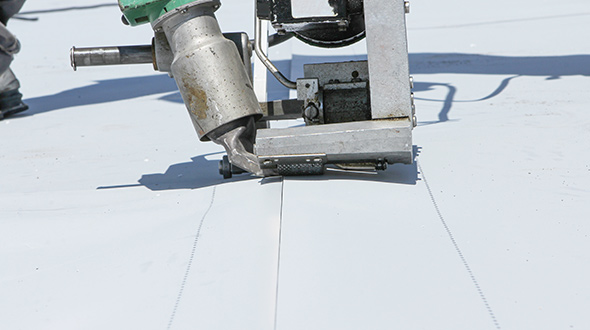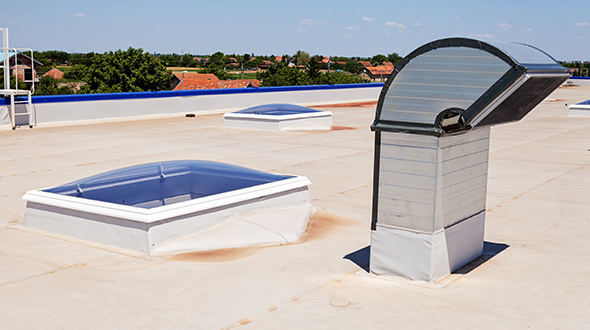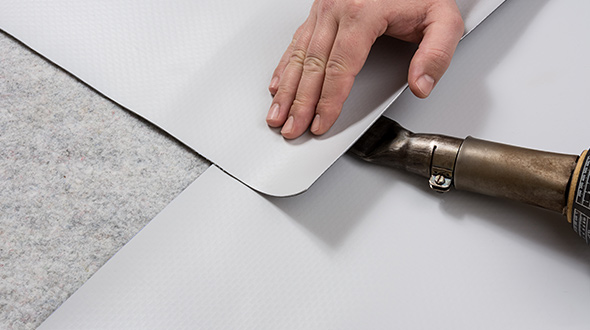
Without knowing the pros and cons of TPO and PVC, you risk buying a roofing system that’s not suitable for your specific property needs. Even though the membranes may appear to be the same, PVC and TPO roofing systems are quite different.
atlantacommercialroofingcontractors.com gathered essential information about the composition and differences between PVC and TPO roofing systems.
PVC vs. TPO – What Is Their Composition?
Looking at a completed PVC or TPO installation, you may think the material looks identical. Still, the two are very different in composition.
PVC (Polyvinyl Chloride) – This membrane consists of two PVC plies that sandwich a polyester reinforcement sheet. Included in the manufacturing of PVC plies are:
• Ultra-violet light inhibitors
• Color pigments
• Fiberglass or polyester reinforcement
• Plasticizers (for plasticity and flexibility)
• Biocides (help deter mold, bacteria, algae, rodents, and insects)
Hot-air welded seams help PVC roofing remain watertight under a variety of severe weather conditions.
TPO (Thermoplastic Polyolefin) – To produce the TPO membrane, manufacturers will polymerize polypropylene and ethylene-propylene rubber. Like PVC, two TPO plies sandwich a polyester reinforcement sheet. The following are used in the production of TPO plies:
• Ultra-violet light inhibitors
• Color pigments
• Fiberglass
• Talc
Due to the composition of the membrane, plasticizers are not required for its plasticity or flexibility. When designed using the right processes, they perform very well, even in harsh conditions.
Like PVC, TPO employs hot-air welded seams to stay watertight during severe weather and pooling of water. To learn more about TPO roofing system, visit atlantacommercialroofingcontractors.com/tpo-roofing-system-explained/
PVC vs. TPO – Performance Comparison
The following chart will help you compare the performance of TPO and PVC roofing materials and determine the best selection for your new commercial roofing system installation:
|
Comparison Metric |
PVC |
TPO |
Result |
|
Composition |
Polyvinyl Chloride |
Thermoplastic Polyolefin |
No Advantage |
|
Years in Production as Roofing Material |
60+ years with several reformulations |
30+ years with multiple reformulations |
No Advantage |
|
Roof Temperature Impact |
Cooling |
Cooling |
No Advantage |
|
Membrane Thickness |
From .036 to .090 |
From .045 to .080 |
No Advantage |
|
Seaming Method |
Heat Welded |
Heat Welded |
No Advantage |
|
Material Reinforcement |
Polyester Reinforcement (scrim reinforced) |
Polyester Reinforcement (scrim reinforced) |
No Advantage |
|
Chemical Resistance |
Excellent (nonreactive to most chemicals) |
Good (may react to oil or grease exhaust) |
PVC |
|
Fire Resistance |
Excellent |
Poor |
PVC |
|
Tear Strength (pound force p/ in) |
45 lbf |
55 lbf |
TPO |
|
Break Strength (pound force p/ in) |
200 lbf |
220 lbf |
TPO |
|
Slippery When Wet |
Yes |
Yes |
No Advantage |
|
Average Cost Installed |
Can range from $5 to $12 per square foot depending on membrane thickness |
Can range from $7 to $13 per square foot depending on membrane thickness |
PVC |
In addition to the information above, the following should be taken into consideration:
TPO presents superior results for tear and break strengths, while PVC outperforms in chemical resistance, fire resistance, and overall cost. Restaurants or buildings with grease traps on the roof would be better served by a PVC roofing system.

When it comes to durability, the thickness of TPO and PVC membranes influence their lifespan and pricing significantly. It is strongly recommended that the thickest membrane available (within your budget constraints) be utilized.
Tip: Do not base your roofing system selection on price alone. If you choose to install TPO products, have your contractor provide information about the manufacturer. Work with contractors whose manufacturers have 20 years or more in TPO production and offer a clear warranty policy on their products.
PVC vs. TPO – Warranties
For the purchase of a PVC or TPO roofing system installation, there will be two warranties to take into consideration before closing any deal. First is the manufacturer’s warranty. This warranty will typically cover any defects in the manufacturing of the roofing membrane.
The second warranty is provided by the roofing contractor to cover his workmanship. This warranty should include what items are covered and what actions will void the warranty.

Since the coverage and duration of these warranties depend on the contractor and the roofing system manufacturer, this is on a case-by-case scenario and there is no clear advantage for TPO or PVC.
Tip: Only agree to the installation of a TPO or PVC roofing system once you are satisfied with the coverages promised by the manufacturer’s and contractor’s warranties. Upon completion of the installation, ensure that your warranty certificates and descriptions are kept with your roofing documentation.
PVC and TPO Roof Differences
In this article, you discovered the differences in composition, performance, and durability of TPO and PVC roofing systems.
By knowing how TPO membranes differ from PVC membranes, you can make informed decisions regarding the appropriate roofing system for your commercial building.
Without considering your building’s needs and which roofing system best meets them, you risk making a capital investment on a roof that will likely fail prematurely.
Sources:
astm.org/SNEWS/AUGUST_2003/obeoli_aug03.html
everybodyneedsaroof.com/thermoplastic-membranes
firestonebpco.com/us-en/roofing/tpo-roofing-systems
vinylroofs.org/
rci-online.org/wp-content/uploads/2003-09-whelan.pdf

No comments:
Post a Comment
Note: Only a member of this blog may post a comment.